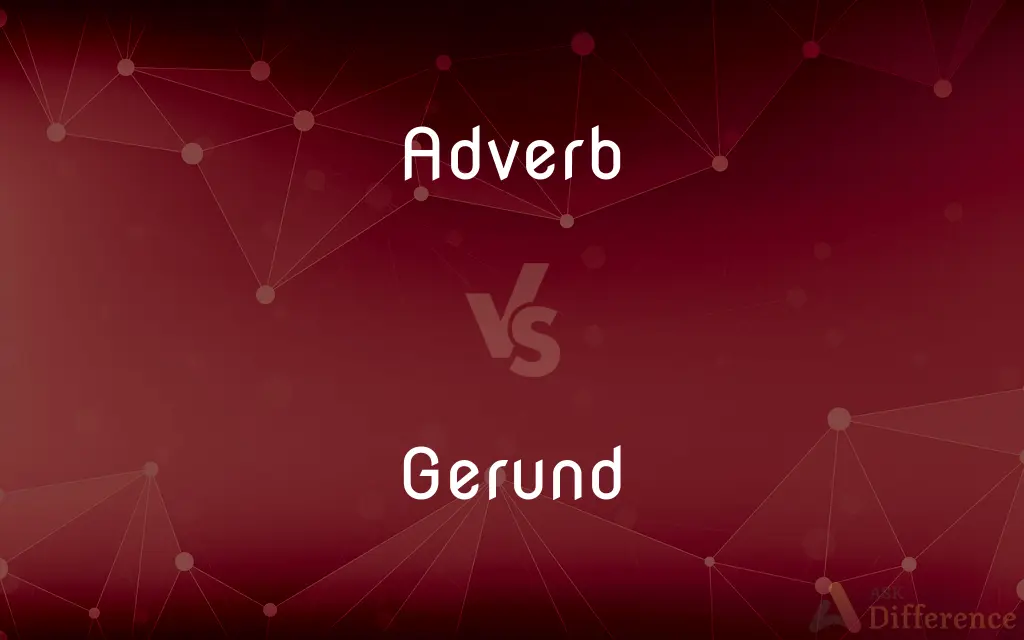Adverb vs. Gerund — What's the Difference?

Difference Between Adverb and Gerund
ADVERTISEMENT
Compare with Definitions
Adverb
An adverb is a word or an expression that modifies he a verb, adjective, another adverb, determiner, clause, preposition, or sentence. Adverbs typically express manner, place, time, frequency, degree, level of certainty, etc., answering questions such as how?, in what way?, when?, where?, and to what extent?.
Gerund
A gerund ( abbreviated GER) is any of various nonfinite verb forms in various languages; most often, but not exclusively, one that functions as a noun. In English, it has the properties of both verb and noun, such as being modifiable by an adverb and being able to take a direct object.
Adverb
A word or phrase that modifies or qualifies an adjective, verb, or other adverb or a word group, expressing a relation of place, time, circumstance, manner, cause, degree, etc. (e.g., gently, quite, then, there).
Gerund
In Latin, a noun derived from a verb and having all case forms except the nominative.
Adverb
The part of speech that modifies a verb, an adjective, another adverb, or an entire clause or sentence.
ADVERTISEMENT
Gerund
In other languages, a verbal noun analogous to the Latin gerund, such as the English form ending in -ing when used as a noun, as in singing in We admired the choir's singing. See Usage Note at fused participle.
Adverb
Any of the words belonging to this part of speech, such as so, very, and rapidly.
Gerund
(grammar) A verbal form that functions as a verbal noun. (In English, a gerund has the same spelling as a present participle, but functions differently; however, this distinction may be ambiguous or unclear and so is no longer made in some modern texts such as A Comprehensive Grammar of the English Language and The Cambridge Grammar of the English Language)
Adverb
(grammar) A word that modifies a verb, adjective, other adverbs, or various other types of words, phrases, or clauses.
Gerund
(grammar) In some languages such as Dutch, Italian or Russian, a verbal form similar to a present participle, but functioning as an adverb to form adverbial phrases or continuous tense. These constructions have various names besides gerund, depending on the language, such as conjunctive participles, active participles, adverbial participles, transgressives, etc.
Adverb
(programming) In the Raku programming language, a named parameter that modifies the behavior of a routine.
Gerund
A kind of verbal noun, having only the four oblique cases of the singular number, and governing cases like a participle.
Adverb
(rare) To make into or become an adverb.
Gerund
A verbal noun ending in -e, preceded by to and usually denoting purpose or end; - called also the dative infinitive; as, "Ic hæbbe mete tô etanne" (I have meat to eat.) In Modern English the name has been applied to verbal or participal nouns in -ing denoting a transitive action; e. g., by throwing a stone.
Adverb
A word used to modify the sense of a verb, participle, adjective, or other adverb, and usually placed near it; as, he writes well; paper extremely white.
Gerund
A noun formed from a verb (such as the `-ing' form of an English verb when used as a noun)
Adverb
The word class that qualifies verbs or clauses
Adverb
A word that modifies something other than a noun
Share Your Discovery

Previous Comparison
Orangery vs. Greenhouse
Next Comparison
Technique vs. Technology















































